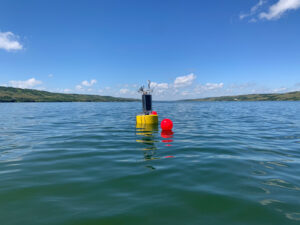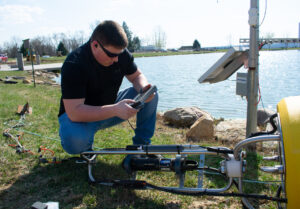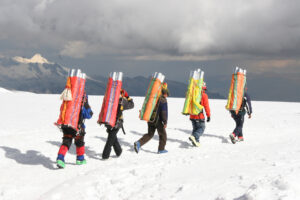YSI 6-Series Sonde Vented Field Cables
Features
- Sonde connectors have a built-in "key" to ensure proper field cable pin alignment
- For sondes with level sensors, vented field cables eliminate errors due to barometric pressure
- If you do not see your desired length, contact us for additional cable lengths and pricing
- Expedited repair and warranty service
- Lifetime technical support
- More
Overview
The YSI 6-series vented field cables are used to connect the 6-series sondes to the 650 display units. For sondes with level sensors, vented field cables are used to eliminate errors due to changes in barometric pressure.
Connection
For connecting the field cable to the sonde, the sonde connector has a built-in "key" to ensure proper pin alignment. Additionally, an integrated strain relief connector attaches to the sonde bail for added support during sampling and deployments. The other end of the field cable is a military-style 8-pin connector (MS-8). This MS-8 connector plugs directly into the 650 MDS display/logger. The 650 contains a microcomputer that allows it to be used in a similar manner to that of a terminal interface to a PC. Through the use of a YSI 6095B (MS-8 to DB-9) adapter, the sonde may be connected to a computer for setup, calibration, real-time measurement, and uploading files.
- Warranty: 2-years
In The News
Combating Water Insecurity in Saskatchewan with Real-Time Data
The prairies of Saskatchewan can be described as one of the least water-secure parts of Canada, making water quality monitoring essential for informed resource management in a region already facing water insecurity. While natural physical properties worsen some of the poor water quality conditions in the region, others are connected to land use. Having grown up spending summers on the shores of Lake Huron, Helen Baulch, an associate professor at the School of Environment and Sustainability at the University of Saskatchewan , has always been dedicated to the protection of water resources. Looking back fondly at her childhood playing along the shore, Baulch also recalls the invasion of quagga mussels during her teenage years and watching the lake change as a result.
Read MoreSeametrics Turbo Turbidity Logger: Boost your Turbidity Monitoring
The Seametrics Turbo Turbidity Logger is a self-cleaning turbidity sensor capable of internally logging over 260,000 data records. The sensor enables researchers, compliance officers, and contractors to monitor turbidity in various applications, from construction and dredging sites to wastewater effluent. Due to its narrow width, this device can be deployed in a range of areas, from small well spaces to rivers and streams. The stainless steel housing and built-in wiper allow the sensor to withstand long-term deployments and reduce the need for maintenance trips. The logger accurately records temperature and turbidity up to a depth of 50 meters.
Read MoreCollecting Data at the Top of the World: How Scientists Retrieve Glacial Ice Cores
A helicopter touches down in the small town of Sicuani, Peru, at an elevation of 11,644 feet. Earlier that day, a boxcar brought fuel, drills, food, and other equipment for a glacial expedition. The year is 1979, and glaciologist Lonnie Thompson is preparing to lead a team to the Quelccaya ice cap in hopes of becoming the first scientists to drill an ice core sample from this glacier. The only problem? The glacier is located at 19,000 feet in one of the most remote areas of the world. The helicopter takes off from the town, but the thin atmosphere at that elevation does not allow it to safely touch down on the ice– due to the aircraft’s weight, and it becomes unstable when the air is less dense.
Read More




















